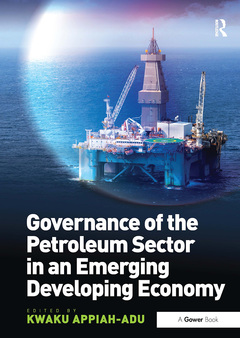Governance of the Petroleum Sector in an Emerging Developing Economy
Auteur : Appiah-Adu Kwaku

Date de parution : 06-2024
17.4x24.6 cm
Date de parution : 08-2013
17.4x24.6 cm
Thèmes de Governance of the Petroleum Sector in an Emerging... :
Mots-clés :
revenue; resource; management; oil; companies; fiscal; regime; agreements; operations; public; Te Ch; Petroleum Revenue Management Law; HSE; Petroleum Revenue Management; Lo Ca; Economic Rent; Civil Society; Ghana’s Petroleum; Revenue Watch Institute; Petroleum Revenues; EITI; International Banks; Petroleum Operations; Revenue Management; Norwegian Model; Ghana’s Natural Resources; Non-associated Gas; Ivory Coast; Contract Transparency; Petroleum Sector; Petroleum Agreements; Norwegian Continental Shelf; Norwegian Approach; Fiscal Design; EITI Report



